South Hadley residents will pay more for trash, wastewater rates next fiscal year
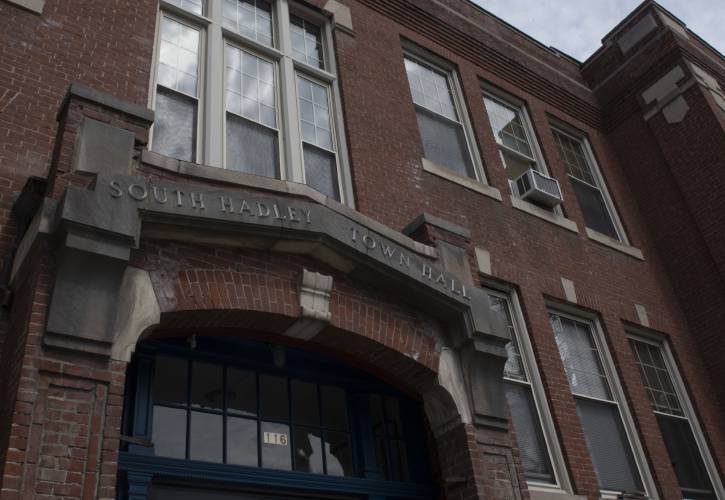
South Hadley Town Hall 04-12-2023
| Published: 04-22-2024 2:41 PM |
SOUTH HADLEY — Property owners can expect to pay more starting July 1 for trash removal and wastewater service following the Select Board’s recent decision to increase rates for both services.
At its April 16 meeting, the board adopted a new automated trash removal system to replace the current pay-as-you-throw system, and adopted an annual fee for fiscal 2025, which begins July 1, at $225. Property owners currently pay a $125 annual trash fee, plus the expense of buying green bags at a grocery store.
The board also set a new wastewater rate of $450 for next fiscal year, up from the current $360, as the town prepares for severalupgrades and improvements to the 40-year-old wastewater treatment plant and pump stations.
Prior to making those decisions, the board held public hearings on April 13 to gauge public opinion on the new trash system and sewer rate increases. Town Administrator Lisa Wong presented several different rate structures for both trash and sewer services, as well as the projected fee increases for fiscal years 2026 through 2029. However, most of the lower rates proposed would only cover a portion of the capital items, or force the town to lease trash carts rather than own them.
The board choose to go with the highest rates to cover the entirety of capital items for the next fiscal year and raise funds to purchase, rather than lease, one trash cart and one recycling cart for each household.
Property owners will continue to use the green bag system that includes manual pickup for next fiscal year while the Department of Public Works purchases, assembles and distributes 13,200 trash and recycling carts to 660 households. A new automated system will begin in fiscal 2026, which begins July 1, 2025, where residents will put trash in carts and only use green bags for overflow. The flat fee will include the price of the carts and biweekly trash pickup. Residents who want weekly pickup would need to pay an additional $210.
“If you’re spending $100 in bags, you’re (expense is) going to be the same. If you’re spending more than $100 on bags, you’ll actually be saving money on the program,” DPW Superintendent John Broderick said at the public hearing.
The size of the carts will be decided at a later date, after the town’s trash removal vendor, Republic Services, surveys residents about their preferred cart sizes. The board is currently looking at a 65-gallon trash cart and 95-gallon recycling cart for biweekly pickup. Residents at the public hearing expressed little desire to haul a 95-gallon barrel to a pickup location, especially seniors with mobility issues.
Article continues after...
Yesterday's Most Read Articles
 A Waterfront revival: Two years after buying closed tavern, Holyoke couple set to open new event venue
A Waterfront revival: Two years after buying closed tavern, Holyoke couple set to open new event venue
 Services being held Thursday for Greenfield homicide victim
Services being held Thursday for Greenfield homicide victim
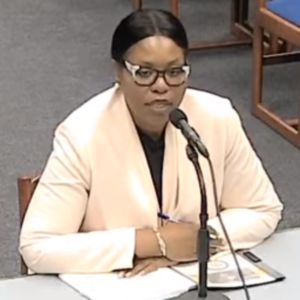 Island superintendent picked to lead Amherst-Pelham region schools
Island superintendent picked to lead Amherst-Pelham region schools
 Area property deed transfers, May 2
Area property deed transfers, May 2
 Granby Bow and Gun Club says stray bullets that hit homes in Belchertown did not come from its range
Granby Bow and Gun Club says stray bullets that hit homes in Belchertown did not come from its range
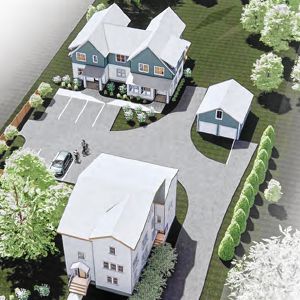 3-unit, 10-bed house in backyard called too much for Amherst historic district
3-unit, 10-bed house in backyard called too much for Amherst historic district
“A senior resident on a private road or house is almost a quarter mile from the trash pickup point,” Anthony Hill and Carlene Riccelli wrote to Wong. “It would be difficult for us to wheel a bin of any size to that point. We are worried that the new system is untenable unless we can have pick up at the end of our driveway.”
People also referred to Holyoke’s transition to an automated system last year, where senior citizens complained they could not haul the 95-gallon carts to the curbside.
“A friend of mine lives in Holyoke, and she’s 79. The bins that they have to use there, she can’t move those bins,” Kathy Davis said.
Broderick admitted that the change to an automatic system will come with challenges, but he’s willing to work with residents to find solutions.
Money raised from the $90 increase in wastewater rates will cover operation costs and six capital items purchased in the upcoming fiscal year: a permanent bypass and transformer upgrade at the main street pump station, two channel grinders, a sewer vacuum truck and a utility truck. The first four items will appear on the upcoming annual Town Meeting’s warrant on May 8, and residents will vote on the two new trucks at fall’s special Town Meeting.
The permanent bypass at the main street pump station will allow water to continue flowing through the wastewater system while DPW conducts renovations. The transformer upgrade is the first in a long line of electrical improvements. The channel grinder is specific for flushable wipes, which can clog and shut down pumps instantaneously.
“You’re trying to balance your rate with what you want to accomplish in the next x-amount of years,” Brodrerick said.
As the wastewater treatment plant nears 45 years without any major renovation, the DPW aims to complete long-overdue upgrades to pump stations and the main treatment plant while simultaneously changing procedures to abide by federal and state environmental regulations. These improvement projects range from millions of dollars to tens of millions of dollars.
“We want to get to the point where we are having small, gradual steady increases that are covering our costs and our capital, but we are in a catch up mode right now,” Wong told residents at the sewer hearing.
Waste disposal rates, whether referring to liquid waste or solid trash, will continue to rise in upcoming fiscal years. Projected increases show a $25 increment every two years for trash and a $50 increase each fiscal year for wastewater, but these are subject to change. The Select Board will vote on each rate change individually.
“If we keep the rates the same, you can see that what happens to the (wastewater) fund balance is that it is not enough to maintain future capital items that are needed and therefore our fund balance is depleted because of that,” Wong said.
Combined with increased property taxes, the two utility price raises pose a financial strain on residents with fixed incomes. Select Board member Renee Sweeney asked funds from general fund, free cash and stabilization funds could be used to mitigate rate increases, but Wong said most of the money in those accounts will fund other capital improvement projects or the operating budget.
“When you’re on a fixed income, we’re not all in it together. If you’re still working, you have a lot more money than we do,” Mark Davis said.
Emilee Klein can be reached at eklein@gazettenet.com.

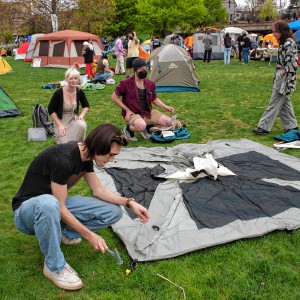 Pro-Palestinian encampment disperses at UMass, but protests continue
Pro-Palestinian encampment disperses at UMass, but protests continue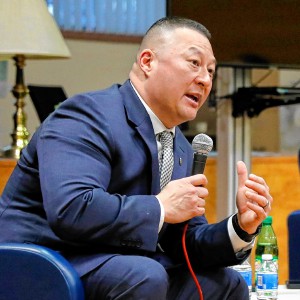 Amherst council confirms Gabriel Ting as police chief
Amherst council confirms Gabriel Ting as police chief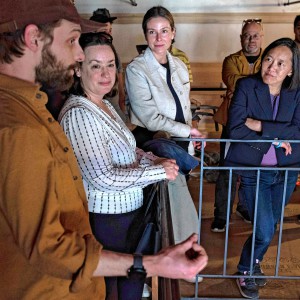 Music key to Northampton’s downtown revival: State’s top economic development leader tours city
Music key to Northampton’s downtown revival: State’s top economic development leader tours city 
